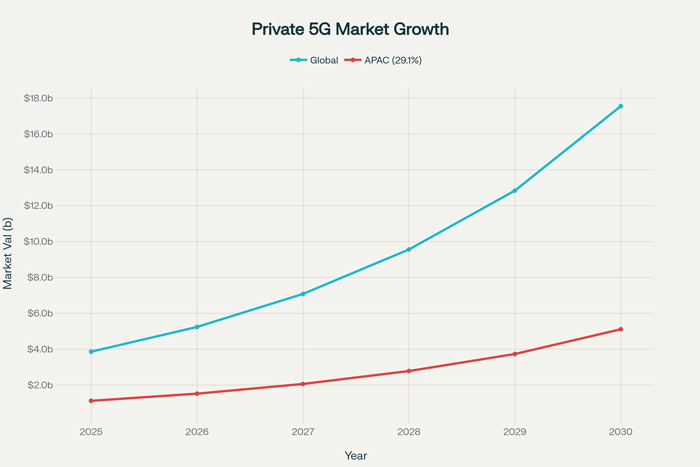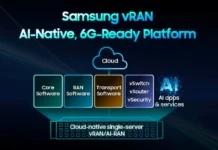The enterprise telecommunications landscape is experiencing a revolutionary transformation through private 5G networks that deliver dedicated, high-performance connectivity solutions tailored to specific organizational requirements. These networks provide unprecedented control, security, and performance guarantees that public networks cannot match, enabling advanced industrial applications and digital transformation initiatives across diverse sectors. With the global private 5G market projected to reach $17.55 billion by 2030 from $3.86 billion in 2025, representing a robust compound annual growth rate of 35.4%, enterprises worldwide are recognizing the transformative potential of dedicated 5G infrastructure.

The Private 5G Advantage
Private 5G networks fundamentally differ from public networks by providing dedicated spectrum allocation, guaranteed performance levels, and complete operational control to enterprise customers. This architecture ensures reliability, security, and operational efficiency that are paramount for industries including manufacturing, logistics, healthcare, and smart cities where uninterrupted connectivity and data privacy are essential.
The dedicated nature of private 5G networks eliminates the performance variability and security concerns associated with shared public infrastructure. Enterprises gain the ability to optimize network parameters for specific applications while maintaining complete control over data flows and access permissions.
Market Growth and Regional Leadership
Asia-Pacific Dominance
The Asia-Pacific region leads global private 5G network adoption, accounting for 29.1% of the global market in 2023 and maintaining its position as the fastest-growing region. This leadership reflects the region’s advanced digitalization initiatives, strong manufacturing base, and favorable government policies supporting Industry 4.0 transformation.
China is expected to register the highest compound annual growth rate from 2025 to 2030, driven by massive industrial modernization efforts and government support for smart manufacturing initiatives. The scale of Chinese manufacturing and the government’s commitment to technological leadership create ideal conditions for extensive private 5G deployment.
Market Segmentation and Growth Drivers
Hardware currently represents the largest revenue-generating segment within the private 5G market, though services are projected to experience the fastest growth during the forecast period. This shift reflects the maturing ecosystem where initial infrastructure investment gives way to ongoing service delivery and optimization.
The Asia Pacific private 5G network market, valued at $587.6 million in 2023, is projected to reach $12,007.2 million by 2030, representing exceptional growth driven by Industry 4.0 initiatives and increasing ecosystem maturity. This growth trajectory demonstrates the substantial market opportunity for both suppliers and enterprises.
Industry Applications and Use Cases
Manufacturing and Industrial Automation
Manufacturing represents the most significant application area for private 5G networks, enabling advanced automation, robotics, and real-time quality control systems. The ultra-low latency and high reliability of private 5G support mission-critical applications including autonomous production lines, predictive maintenance, and digital twin implementations.
Companies across Asia are implementing private 5G to transform production processes through enhanced connectivity that supports massive IoT deployments, edge computing integration, and real-time analytics. These capabilities enable manufacturers to achieve higher efficiency, reduced downtime, and improved product quality through data-driven optimization.
Logistics and Supply Chain
The logistics sector leverages private 5G networks to enable automated warehousing, real-time tracking, and intelligent transportation systems. Ericsson’s deployment of the first full-scale private 5G network for CJ Logistics demonstrates the transformative impact on logistics operations through automation and real-time data exchange.
Private 5G enables logistics companies to implement comprehensive automation solutions including autonomous vehicles, robotic sorting systems, and predictive maintenance programs. These applications require the guaranteed performance and low latency that only dedicated networks can provide.
Healthcare and Smart Cities
Healthcare organizations utilize private 5G networks to support telemedicine, remote patient monitoring, and advanced medical device connectivity. HKT’s private 5G implementation in healthcare demonstrates enhanced connectivity and efficiency in medical services delivery.
Smart city applications benefit from private 5G through comprehensive sensor networks, intelligent traffic management, and emergency response systems. The dedicated infrastructure supports critical city operations while ensuring data security and operational continuity.
Technology Deployment Models
Enterprise-Led Deployments
Standalone enterprise-led deployments provide complete control over network design, implementation, and operation. This model appeals to organizations with substantial technical capabilities and specific performance requirements that demand customized solutions.
Less than one-third of enterprises in Asia-Pacific prefer operators as their private network partners, compared to 55% who favor network vendors. This preference reflects enterprise desire for specialized solutions and vendor expertise in complex deployment scenarios.
Operator-Led Solutions
Telecommunications operators increasingly offer private 5G solutions as managed services that leverage their network expertise and operational capabilities. This approach enables enterprises to access private 5G benefits without substantial internal technical investment.
Despite vendor preference for standalone deployments, operators still see strong demand for private networks, particularly in logistics, media, and healthcare sectors. Over 15% of operators expect private 5G to generate more than 20% of enterprise revenues in 2025, highlighting the significant growth opportunity.
Hybrid Deployment Approaches
Hybrid models combine enterprise control with operator expertise, enabling customized solutions that balance performance requirements with operational efficiency. These approaches often involve spectrum sharing arrangements and managed service components.
The hybrid approach enables enterprises to benefit from operator experience while maintaining control over critical network parameters. This model provides flexibility for organizations with evolving requirements and varying technical capabilities.
Economic Impact and Business Cases
Return on Investment
Private 5G networks deliver tangible return on investment through increased productivity, reduced downtime, and enhanced operational efficiency. Manufacturing companies report significant improvements in production efficiency and quality control through private 5G implementation.
The business case for private 5G strengthens as deployment costs decrease and ecosystem maturity increases. Early adopters demonstrate measurable benefits that justify continued investment and expansion of private network deployments.
Cost-Benefit Analysis
While private 5G requires substantial initial investment, the long-term benefits including operational efficiency, enhanced security, and competitive advantage justify the expenditure for many enterprises. The total cost of ownership often compares favorably to alternative solutions when considering performance guarantees and operational benefits.
Companies implementing private 5G report reduced operational costs through automation, improved asset utilization, and enhanced predictive maintenance capabilities. These operational improvements contribute to rapid payback periods and ongoing cost savings.
Regional Development Initiatives
Government Support and Policy
Countries including China, South Korea, and Malaysia have allocated dedicated spectrum for enterprise 5G deployment, encouraging rapid adoption and commercial viability. This government support creates favorable conditions for private 5G ecosystem development.
Regulatory frameworks increasingly accommodate private 5G deployment through streamlined licensing processes and dedicated spectrum allocation. These policy initiatives reduce deployment barriers while ensuring interference-free operation.
Industry Collaboration
Strategic partnerships between telecommunications operators, technology vendors, and system integrators accelerate private 5G deployment and ecosystem development. These collaborations combine complementary expertise to deliver comprehensive solutions.
Industry associations and government agencies facilitate knowledge sharing and best practice development to support broader private 5G adoption. This collaborative approach accelerates market maturity and reduces deployment risks.
Future Development Trajectory
Integration with Emerging Technologies
Private 5G networks increasingly integrate with artificial intelligence, edge computing, and Internet of Things technologies to create comprehensive digital transformation platforms. This convergence enables more sophisticated applications and enhanced operational capabilities.
The integration of private 5G with emerging technologies positions enterprises advantageously for future innovation and competitive differentiation. This technological foundation supports evolving business requirements and market opportunities.
Ecosystem Expansion
The private 5G ecosystem continues expanding through new vendor partnerships, enhanced service offerings, and innovative deployment models. This ecosystem growth reduces costs while improving solution quality and deployment speed.
Network slicing and edge computing integration create new opportunities for private 5G application development and service delivery. These technological advances enable more granular performance optimization and cost-effective deployment models.
Private 5G networks represent a fundamental shift in enterprise connectivity strategy, enabling unprecedented levels of performance, security, and operational control. Organizations across Asia-Pacific are leveraging these capabilities to drive digital transformation, enhance operational efficiency, and create competitive advantages in rapidly evolving markets.
The substantial market growth projections, demonstrated business benefits, and expanding ecosystem support create favorable conditions for continued private 5G adoption. Enterprises that strategically implement private 5G networks position themselves advantageously for long-term success in increasingly competitive and technology-driven business environments. Success requires comprehensive planning, stakeholder alignment, and strategic execution, but the potential benefits justify the investment through transformative operational capabilities and sustainable competitive advantages.





















